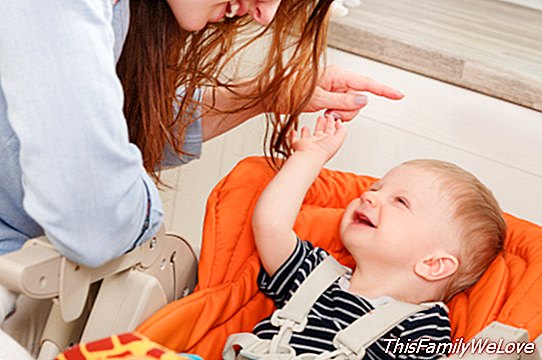Parenting with attachment: benefits and myths
Raising the baby taking into account their needs, respecting their rhythms, with empathy and above all with love, is what is called "upbringing with attachment". Raising while listening to the baby, providing security and confidence, gives from the minute one and long term, has multiple benefits for the baby and for the person who will be in the future.
5 benefits of parenting with attachment
1. Happier babiesThey know that their needs are heard and cared for, with what was stress and anxiety before the uncertainty. They know that they are respected and that they have a place in their family nucleus.
2. More rested babies.The babies that have been embraced, cared for and cared for during the day, at night rest better because the anxiety and stress centers have not been activated.
3. Trust and autonomy. The baby feels that his environment is safe. The environment created through the positive bond between mother and baby provides the security to want to move forward, to experiment, to explore further. He is motivated to learn, to persevere without fustrations. A development from the confidence that will lead to self-sufficiency, autonomy.

4. Greater self-esteem.Following in line with confidence and autonomy is self-esteem. A baby that feels loved, respected and has a place in the family, in the future will know how to face the challenges that arise because he believes in himself and will value his peers.
5. Positive personal relationships. Babies who develop a positive attachment with their parents know, feel that even though their parents are absent, they will return and "dare" to establish bonds of trust with other people (relatives, caregivers ...), which will provide them with the confidence necessary to be able to relate to others.
5 wrong beliefs of parenting with attachment
'Children who collect have a poor quality of sleep'
Babies have a different rhythm of sleep than adults. Their nature causes them to wake up to eat. Both the babies who collect and those who sleep in their room will wake up throughout the night. The time it takes to cover their needs will make them clear or not and keep sleeping. The co-sleeping allows to respond quickly and both the mother and the baby fall asleep again easily and despite the sleep breaks, are rested.
'Children have to learn to sleep alone and in their room'
Babies need a safe environment to grow. The baby does not have the baggage or the tools to provide a suitable habitat for its development. Parents must provide security, warmth, protection, as in the case of sleep, feel safe and sleep peacefully without fear, stress to the unknown, without the anguish of separation from their caregivers. Just sleep.
'Carrying the baby always in your arms will make you insecure'
Carrying the baby encourages positive attachment with their caregivers. The baby feels protected and confident to interact with the outside knowing safe in arms. It is integrated into the activities and this favors the development of self-esteem by being included in the day-to-day dynamics of your caregiver. From the arms the baby shares his experiences with his caregiver, sees the reactions that external stimuli exert on his carrier and learns to discern threatening situations from those that are not, which will accelerate the baby's social relationship with others.
'You have to let the baby cry, do not go to each demand because if not, you will be put on the hump'
Humans are the only mammals that are born without being neurologically developed. His birthday is primitive and is "programmed" to cover the basic survival needs of the newborn. Over time it develops into more complex processes and it is not until 3-4 years that the child begins to have the ability to understand the double meaning of things, the consequences of acts, for example; It's cold, you have to get warm or I'll get cold. They begin to have the ability to manipulate, to feel empathy, etc. That's why if a baby cries when you put him in the crib, you leave the room or just when you get to sleep, it's not to provoke you, it's not because he wants to have fun at your expense, it's simply because they need something that they can not provide themselves.
"The lack of attachment, on the contrary, generates an opposite reaction, to the point of generating what is known as Reactive Attack Disorder, which results in insecure adults unable to maintain healthy and permanent relationships with others. people to achieve their ends, without remorse, they can consent to a relationship, but they do not get emotionally involved ". That is a form of resistance.
Marián Zamora Saborit. Physiotherapist, child psychomotorist in education. Pilates Method Technician. Blog author Mímate a little.
It may interest you;
- The 5 keys of the happiest baby
- Parenting with attachment: the 8 keys to natural aging
- The benefits of 'skin with skin'
- Breastfeeding is worth it




